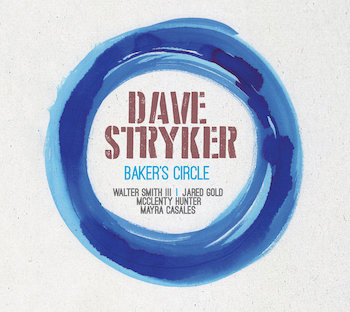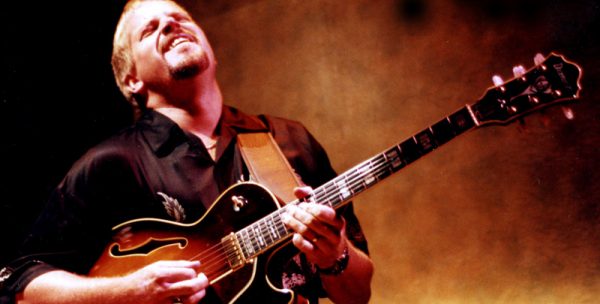Jazz Album Review: Dave Stryker’s “Baker’s Circle” — Welcoming the Past
By Allen Michie
This is a well-rounded session of disciplined, well-crafted composing and soloing, with established and up-and-coming players mixing it up with style and commitment.
Baker’s Circle, Dave Stryker, Strikezone Records
 Those looking for a synthesis of straight-ahead jazz guitar could do worse than to cue up some Dave Stryker. Perhaps it’s a cliché of jazz criticism to go hunting for influences in every musician’s tone or style. But classification serves a vital purpose; it’s about understanding artists though their relationship with jazz tradition. Some, like Stryker, profit from welcoming the past rather than swimming upstream against it.
Those looking for a synthesis of straight-ahead jazz guitar could do worse than to cue up some Dave Stryker. Perhaps it’s a cliché of jazz criticism to go hunting for influences in every musician’s tone or style. But classification serves a vital purpose; it’s about understanding artists though their relationship with jazz tradition. Some, like Stryker, profit from welcoming the past rather than swimming upstream against it.
A lecturer and private instructor in the famed Indiana University Jazz Studies department, Stryker sets a fine example for his students. By imaginatively internalizing what has come before, he creates a recognizable personal sound and compositional style. His latest album is Baker’s Circle, named in tribute to another Indiana University faculty member, one of the godfathers of jazz education, David Baker.
Stryker is a one-note-at-a-time mainstream guitar player with an approach that is part of a family line that goes from Charlie Christian to Jim Hall, Joe Pass, Herb Ellis, Bucky Pizzarelli, Kenny Burrell, and Pat Martino. You can hear traces of all of these performers in Stryker’s solos. He’s further away from the harmonic two-or-more-notes-at-a-time tradition of Wes Montgomery, George Benson, or Emily Remler, although when the moment demands it Stryker can recall those players. The guitarist can swing, and in this album he displays considerable love for the heritage of the soulful jazz organ trio.
Organist Jaren Gold plays on Baker’s Circle, but Stryker expands the instrumentation into a more Jimmy Smith-on-Blue Note sound with Walter Smith III on tenor sax, McClenty Hunter on drums, and Mayra Casales playing percussion on two tracks. The bass is courtesy of Gold’s two feet on the organ, as it should be.
On a genre record like this you expect the organist to be the dominant player. Gold is certainly an excellent musician, but the standout soloist is tenor player Smith, a Bostonian and fellow jazz educator at the Berklee College of Music. Keep an eye on him; check out his six headlining albums and over 100 sessions with other musicians. He plays with confidence, control, imagination, and a style that’s a cross somewhere between Joe Lovano and Michael Brecker. Between Gold and Smith, Stryker couldn’t help but sound good, even if he weren’t already an A-list player.
Baker’s Circle opens with “Tough,” a Stryker original, and it’s a good example of his solo style. The guitarist does what jazz musicians often tell their students to do — memorize all the scales in all the keys, then forget them so they can emerge unforced. The solo phrases are often based on scale patterns, but they are stretched, inverted, staggered, or juxtaposed. Stryker will play a lick and repeat it with variations up and down the fretboard. It’s a signature style, but there is little repetition overall from solo to solo.
Smith is sympatico with Stryker. They make a strong pair — it isn’t hard at times to imagine the solos of one transposed for the other. The uptempo “Rush Hour” is a convoluted Stryker composition in several time signatures that seems to be a nod to Pat Martino’s recent work. Smith chews through the changes like they’re nothin’, Gold stretches out, and Stryker cools the proceedings down with grace and ease. Hunter takes a brief solo on drums — everyone gets to show off their bop chops.

Dave Stryker in action. Photo: courtesy of the artist.
“Trouble (No. 2)” is a shuffle blues originally recorded by Stanley Turrentine (Stryker’s former employer) with Kenny Burrell on guitar. The melody borrows heavily from Little Willie John’s “Fever” (you know it from Peggy Lee’s version). The unison melody shared by sax and guitar sounds fat and happy. Stryker’s not one to get carried away — his is still a tightly controlled solo, developed and well-structured. This track is an example of how Gold is such an interesting and uncommon organist: the classic organ solo structures are here, holding that long blue note and releasing it with a fast run down the blues scale. But Gold doesn’t overdo it. Players like Groove Holmes and Charles Earland were generous with the kind of crowd-pleasing long blue notes, triplets, and roaring riffs that could bring audiences to their feet. But that grandstanding isn’t in keeping with the band aesthetic here. Gold is in the jazz club rather than the church: he keeps it in the pocket, and he keeps your focus on what’s needed for the song. On “El Camino,” a Stryker original with a Latin feel, it’s intriguing to hear both Gold and Stryker comping behind Smith’s solo. They stay out of each other’s way, playing to the strengths of their instruments. Gold embraces sustained tones; Stryker contributes percussive short phrases.
Finally, props to the drummer. Hunter is impressive throughout. He’s on the busy side, playing crisp fills throughout, and goosing the players without getting in the way. There’s a rich variety of grooves on the title track, “Baker’s Circle”: a bit of Latin, some chugging blues, jazz/rock fusion, and some salsa. Hunter has a brief solo, but really the entire track is his feature. Dig Hunter’s tight backbeat on Marvin Gaye’s “Inner City Blues,” too.
Baker’s Circle would make David Baker proud. It’s a well-rounded session of disciplined, well-crafted composing and soloing, with established and up-and-coming players mixing it up with style and commitment. There’s no cutting-edge jazz here and little you haven’t heard before, but you’ll hear elaborations on the glorious past played well — and be glad you did.
Allen Michie works in higher education administration in Austin, Texas. He was fortunate to have studied with some fine jazz educators—including the great Bill Hanna of Charlotte, NC who died on January 13—but he found the pen more forgiving than the reed.

Nice review Allen. Just for the record though, the tune “Rush Hour” is actually a Jared Gold composition and not Dave’s.
Take care.
Lyle